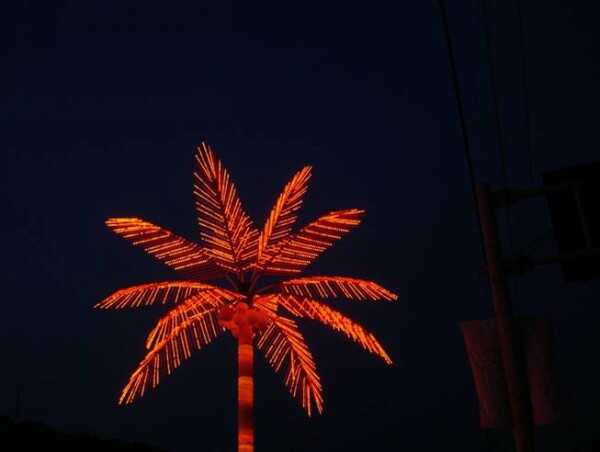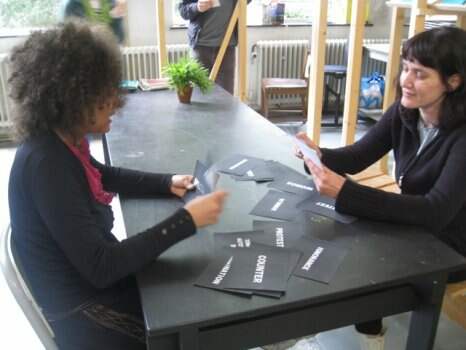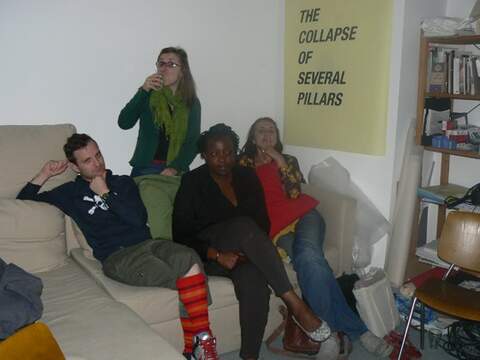2008 - 2009: We Correspondents
Project, 15 Jan – 05 Jun 2009
Commissioned by the Dutch Art Institute, 'We Correspondents' is a discursive framework for a group of DAI students that is developed by Casco Office for Art, Design and Theory in relation to the independent curatorial initiative 'Electric Palm Tree' (www.electricpalmtree.org).
Participating artist-students: Monika Berenyi, Buba Cvoric, Terersa Maria Diaz Nerio, Tzvika Gutter, Taf Hassam, Yota Ioannidou, Omar Koubaa, Seda Manavoglu, Sasha Miljevic and Barbara Phillip. 'We Correspondent' is conceived and organized by Binna Choi (director of Casco and co-founder of Electric Palm Tree) and assisted by Yolande van der Heide (project coordinator of Casco).
'We Correspondents' is designed to explore the possibilities of "correspondence" as a concept and a method for artistic agency through a series of group exercises, meetings and discussions. One session is built into another to form reflective strata for critically investigating existing and alternative modes of "correspondence". This is also done in order to find room for expanding the notion of "correspondence" within and outside of the group as well as against the condition of their international backgrounds. In this context, the social and political meaning is also reflected.
1
Beginning. Skype. Newspapers Around the World. Gaza War.
15 January 2009
Initiating layered notions of contemporary correspondence, we began with a Skype conference call linking Enschede, The Netherlands and Seoul, Korea, whereby we met each other and correspondence was funnelled to represent news from our different pockets of the world.
As for the first exercise, news pieces on the Gaza War from different dailys accessible to the artists, in terms of respective or preferred languages, were compared and analyzed. This was complimented by a screening of video works by Nam June Paik including 'Bye Bye Kipling' (1986) and 'Good Morning Mr Orwell' (1984) that exemplify a mode of experimental "global linkage" attempts.
2
Identity vs. Subjectivity. Use of Speech. Performativity. Film. Anthropophagy. Otherness.
6 January 2009 Guest: Wendelien van Oldenborgh*
Continuing from our concern with the divisions and gaps of the world and different realities produced by this condition, artist Wendelien van Oldenborgh introduced her working methods and critical inquiry: "My works take specific situations – historical or otherwise – as departure points to display social conditions by focussing on relations and gestures in the public sphere. The cinematic format is used as a methodology for production and as the basic language for various forms of presentation. An important stage in the work is the active and often public film-shoot, in which participants co-create the script in an active event of live performance and exchange.... In a moment of changing and charged cultural relations and heavy conservative forces reacting on these changes, a need seems to surface to focus on different modes of perception and production of narrative, as well as on the politics and construction of subjectivity. Identity to me is not the issue. The idea of "identity" - national or otherwise - is too rigid. We are talking about formation of subjectivities, which is never without paradoxes... "
*Wendelien van Oldenborgh is an artist based in Rotterdam. After graduating from Goldsmiths' College in London, she worked in Belgium and Germany for many years. Van Oldenborgh films communication and interaction between individuals, often against the historical grain and in (public) locations. Her work thus investigates society's political and cultural relationships whilst threading the past with the present in order to offer alternative public discourse.
3
Identity vs. Subjectivity. Internationalism. Borderless. Being Foreign. Image-Talk.
12 February 2009
All day round table discussion on the notion of identity and subjectivity, particularly with the focus on the usage of these notions and their context. This led to the discussion on "borderlessness" and "being foreign" as ambivalent conditions for artistic practice. In this context, the notion of "internationalism" was investigated in effort of clarifying it. A few journalistic images as well as the films including 'Summer Days in Keijo' by artist Sung Hwan Kim and 'Nina Goes to Market' the first fictional film produced in Indonesia in the 1920's were shared and discussed in light of the complex dynamics of an image in different subjective contexts.
4
Cartography. Financial Crisis. Our Economy. Who's Economy?
13 February 2009 Guest: Lize Mogel
In the context of the exhibition 'An Atlas of Radical Cartography' at Casco and the sub-project entitled 'Our Economy', New York based artist and co-curator of 'An Atlas...' Liz Mogel led a cartographic workshop and round table discussion drawing from current issues concerning the global financial crisis.
'An Atlas of Radical Cartography' was originally initiated and convened as a publication of ten maps together with ten accompanying essays by Lize Mogel and Alexis Bhagat. As a travelling exhibition, it was received at several institutes in the United States and was also shown in Canada and Sweden. Lize Mogel is an interdisciplinary artist who works with the interstices between art and cultural geography. She inserts and distributes cartographic projects into public space, including in Los Angeles (Public Green, 2001) and the Wood River Valley, Idaho (Migration Routes, 2007), via publications. Mogel also realized a solo project 'Area of Detail' at Common Room, New York City, NY.
Additionally, the group discussed the possibility of forming a fictional international artistic movement (concerning the subject: "misunderstanding") .
5
Fiction of An International Artistic Movement. Absence of Movement. Letter-writing. Otherness. Home vs. Nation-State.
12 March 2009 Skype-Guest: Grace Samboh
Yogyakarta based cultural critic and curator Grace Samboh shared her view on the (absence of) artistic movements in Indonesia. The discussion continued to the impossibility of creating a fictional form of such a movement.
Instead, we revisited the notion of otherness and discussed the relation between the discourse of home and a nation state whereby we understood "home" to be a subjective something and loosely utilized the term "nation state" to express and incorporate homogenising powers that instate (false) collectives in order to delegate. As a group exercise, we all chose to write a form of a letter to discuss these issues.
6
International Institute of Social History (IISH). Correspondence Archive. Corresponding with archive.
13 March 2009
With conflicting understandings of home as an emotional sentiment and national state as a governing structure from the previous session, we researched archived socio-political letters from various international conflicts, revolutions or personal correspondences. It was a half-day research procedure carried out in order to discover how conflicts and/or objectives were shared in correspondence.
7
Antagonistic Link. Pornomiseria. Representation of Other. Internationalization. Uneven Distribution of Wealth. Communism.
23 April 2009 Guest: Michele Faguet*
Starting with a view of 'The Antagonistic Link'** exhibition at Casco, a one-day workshop with writer and curator Michele Faguet was held. The workshop focused on the "pornomiseria" discourse often associated with surcharge cinema where representations of poverty were questioned: "The term "pornomiseria" was originally coined by Colombian filmmakers Carlos Mayolo and Luis Ospina in the 1970s to describe the proliferation of voyeuristic, amateur social documentaries being made in Colombia and other Latin American countries that exploited and packaged poverty and social problems to meet the increased demand for third-world cinema by European film festivals and television. In recent years, the term has enjoyed a resurgence within the context of contemporary art discourse in Colombia to critique art practices deemed exploitative and opportunistic in relation to the country's complex social and economic problems."
After the workshop, the group attended a panel discussion on the relevance and meaning of the notion of communism as elaborated by French philosopher Alain Badiou on the occasion of the publication of the English/Serb-Croatian translation of 'Of an Obscure Disaster/Mračni raspad' at Maison Decartes in Amsterdam.
* Michèle Faguet is a freelance writer and curator living in Berlin. Previously she directed non-profit exhibition spaces in Mexico City (La Panadería); Bogotá (Espacio La Rebeca); and Vancouver (Or Gallery); and was assistant professor of art history and theory at the Universidad de los Andes, Bogotá. Recent publications include "Soy mi madre: Conversation between Phil Collins and Michèle Faguet," El Tiempo Celeste (Spring 2009); "Je est un autre: la estetización de la miseria," Ensayos sobre Arte Contemporáneo en Colombia (Universidad de los Andes, 2008); and "El sueño de la razón que produce monstruos: On the Work of Javier Téllez" Afterall (Summer 2008). Faguet received an MA in art history from Columbia University in 1996.
** 'The Antagonistic Link', a project by Electric Palm Tree at Casco, is an experimental setting for drawing trans-national links in the form of an agonistic process that assumes the opposing parties to be in a state of conflicting coexistence. 'The Antagonistic Link' uses 'Bye Bye Kipling', a historical satellite event conceived by Nam June Paik in 1986, as a point of departure. The exhibition combined this piece with three other projects initiated by artists and designers from South Korea, as well as other related activities. All these works explore the constructive possibilities of overcoming the sense of distance and antagonism that is the paradoxical product of advancing globalization. The project features the works: 'Mixterminal' by Mixrice, 'Heavy Metal (News) Around the World' by Sasa |44| with Sulki & Min, 'Bye Bye Kipling' by Nam June Paik, 'Operational Play' by Hwayeon Nam.
8
Power of Listening. Demon of Comparison. Correspondence Archive of Anarchist Karl Max Kreuger
24 April 2009 Guest: Nicoline van Harskamp*
We participated in a work in progress entitled 'The Power of Listening' by artist Nicoline van Harskamp, a staged panel discussion with as many loops misinterpretations and black holes as the brain and the memory itself. This was followed by a meeting with van Harskamp concerning this project as well as her new research project 'Archive Kreuger' with the correspondence archive of anarchist Karl Max Kreuger at the International Institute of Social History (IISH). This meeting shed light on the mode of correspondence in the recent anarchist movement and on an international dimension.
The day's programme also gave room for a group visit of another exhibition by Electric Palm Tree at SMBA entitled 'The Demon of Comparisons'* along with a discussion on collaborative curating and its necessity and fallback. In this context, we also discussed our final group exercise which amounted to using the postcard as a format for exchanging ideas or works that were not yet realized by each artist and holistically having them realized by a different member of the group.
* Nicoline van Harskamp is an artist based in Amsterdam, where she recently completed a residency at the Rijksakademie. She was nominated for the Prix de Rome (2009). The Power of Listening was produced and presented as part of this competition.
** 'The Demon of Comparisons': In collaboration with The Antagonistic Link and under Electric Palm Tree, is an association of subjective positions relating in various ways to larger social and political frameworks, to power and cultural constructions. Persisting on the issue of individual agency in a landscape defined by questions of national and cultural identities, 'The Demon of Comparisons' questions the kind of collectivity these subjects can form. Project Artists: Heman Chong, Hafiz, Beom Kim, Sung Hwan Kim, Tibor Hajas, Wendelien van Oldenborgh, Tadasu Takamine, and with special contributions by Philippe Rekacewicz and Grace Samboh.
9
Lying Freely. Public Voice. Archive and Privacy. Space
4 June 2009 Guest/Host: Ruth Buchanan*
Ruth Buchanan, artist and currently researcher at Jan van Eyck Academie, hosted the group in her (private) studio at Jan van Eyck Academie and led a workshop in the resonance of her long-term project 'Lying Freely'. The group participated in different exercises and discussions that choreographed spatial, temporal arrangements whereby (public) historical figures and voices may correspond with each other on alternate grounds. Additionally, conventional (academic) methods of archiving were challenged and new alternatives were sought in light of the artist's responsibility to the public.
With reference to the fragility and malleability of constructed space, the workshop also included a screening of 'Koolhas Houselife' (2008) by Ila Beka and Louise Lemoine.
* In her work, Ruth Buchanan addresses how artistic legacy characterizes artistic agency in the present. She does so by working in various forms and tones- video, text, sculpture, sound, 35mm slide and readings, bringing these various elements together in choreographed spatial and temporal arrangements and situations. She completed her MFA at the Piet Zwart Institute, Rotterdam in 2007 and is currently a researcher at the Jan van Eyck Academie, Maastricht. Buchanan has shown her work in Europe, Australia and New Zealand and actively initiates and contributes to print based projects. Over the course of the year (2009-2010), she is developing her project 'Lying Freely' via three different stages co-organized by Casco, Office for Art, Design and Theory, If I Can't Dance and The Showroom.
10
Corresponding We Correspondents
5 June 2009
The final group "corresponding" exercise as planned in the previous meeting: exchanging the ideas of a project/work, which is not yet realized, via postcards and having it realized by another member of the group. Each member presented and shared their outcomes:
Tzvika Gutter visualized the disability of communication via "the tragedy of Skype" by corresponding with his mother in Tel Aviv with visual aid. Rather than regarding the technological nuisances as the default of this sort of correspondence, he embraced this miscommunication, and used it as a point of departure for rehabilitating the distanced communication. He drew from Yota Ioannidou's unrealised project of family journeys in Eastern Europe between 1981 and 1986.
Seda Manavoglu drew from Gutter's notion of "fixed camouflage for social chameleons". Manavoglu's film project investigated 'Turkishness' by thematizing seemingly mundane day-to-day Turkish happenings or "doxa". This exercise is still in progress and features themes such as children reciting the national anthem as part of the morning school ritual.
Buba Cvoric saw Manavoglu's 'City of Ghosts' within her immediate living place, her apartment and realized the "wheels of the system" and it's structures in the body of her apartment, her daily practices and at times her travels.
Yota Ioannidou and Terersa Maria Diaz Nerio collaborated in a performance piece that deals with and notions of "half knowledge", a concept proposed by Cvoric. The performance staged austere dialogues between the two artists by exchanging word cards on which different political notions, particularly in relation to "protest", were written and by reciting these words aloud, as inspired by the photographs of May 68 in Paris from the IISH archive. The performance created a space of frenzy that discloses the "meanings" but reveals the impossible articulation of their mode of existence.
Sasha Miljevic embraced notions of miscommunication through language by reading personal text in his native tongue Croatian succeeded by interpretive drawings.
This exercise was a response to Omar Koubaa's proposal on the notion of "retinal playing fields".
Barbara Phillip worked from Milevic's unfinished letter to his parents on his trip to Croatia and his encounter of estrangement. The outcome was unfolded into a few short poems.
Monika Berenyi was given Taf Hassam's 'Opinionist Manifesto' in which he indirectly pleads for the need for individual positions and propositions and the alternative way of exchanging them. No exercise but her views on the 'Opinionist Manifesto' were given.
Taf Hassam considered and discussed the impossibility of possessing Phillips's proposal to imagine impregnated womb and opted to realize it by drawing a line in a form of round belly on her sent postcard. This looked like a rainbow or an imaginary homeland.
Omar Koubaa was unable to attend this session.
https://casco.art/activity/we-correspondents/



